Modern magic text adventure Thaumistry tries to balance puzzles and people
It's the creation of Bob Bates, responsible for genre classics like Eric the Unready and Infocom's Sherlock and Arthur.

Thaumistry: In Charm's Way is a rare thing—a commercially released text adventure, available on Steam. The author, Bob Bates, wrote for Infocom and Legend Entertainment in the '80s and early '90s, and successfully Kickstarted Thaumistry early in 2017. The story is classic fantasy-adventure stuff: you play a young inventor facing a bit of inventor's block, then one day you discover you have arcane powers and you need to use them to save the magical world from the threat of discovery.
One of the spells you learn early in the game can fill a target object with air: cast it on living creatures, and you get a variety of belch and fart jokes.
There is a hardcore of interactive fiction fans who have been playing text adventures continuously since their commercial heyday. In the intervening time, the genre has developed away from its roots, with more characterized protagonists, shorter durations, experimental structures, and esoteric premises as in freeware text adventures like Chandler Groover's EAT ME, about a castle made entirely of food that the player has to traverse using the verb 'eat', and Mike Spivey's A Beauty Cold and Austere, a puzzle game about conceptual mathematics. Then there's Andrew Plotkin's Hadean Lands, a game so intricate Plotkin developed a special system to let players track and replay past puzzle solutions as needed.
Thaumistry isn't designed primarily for that audience. It's aiming to be more accessible, more friendly, less of an art-house piece. In style it draws on the text adventure tradition of the '80s—the story and the interactions are light-hearted and playful, offering Infocom-style spell-casting with a wide range of silly responses. One of the spells you learn early in the game can fill a target object with air: cast it on living creatures, and you get a variety of belch and fart jokes. There are quite a few places where, in classic adventure game style, the player needs to go somewhere or take something just because the opportunity exists, without any particular justification.
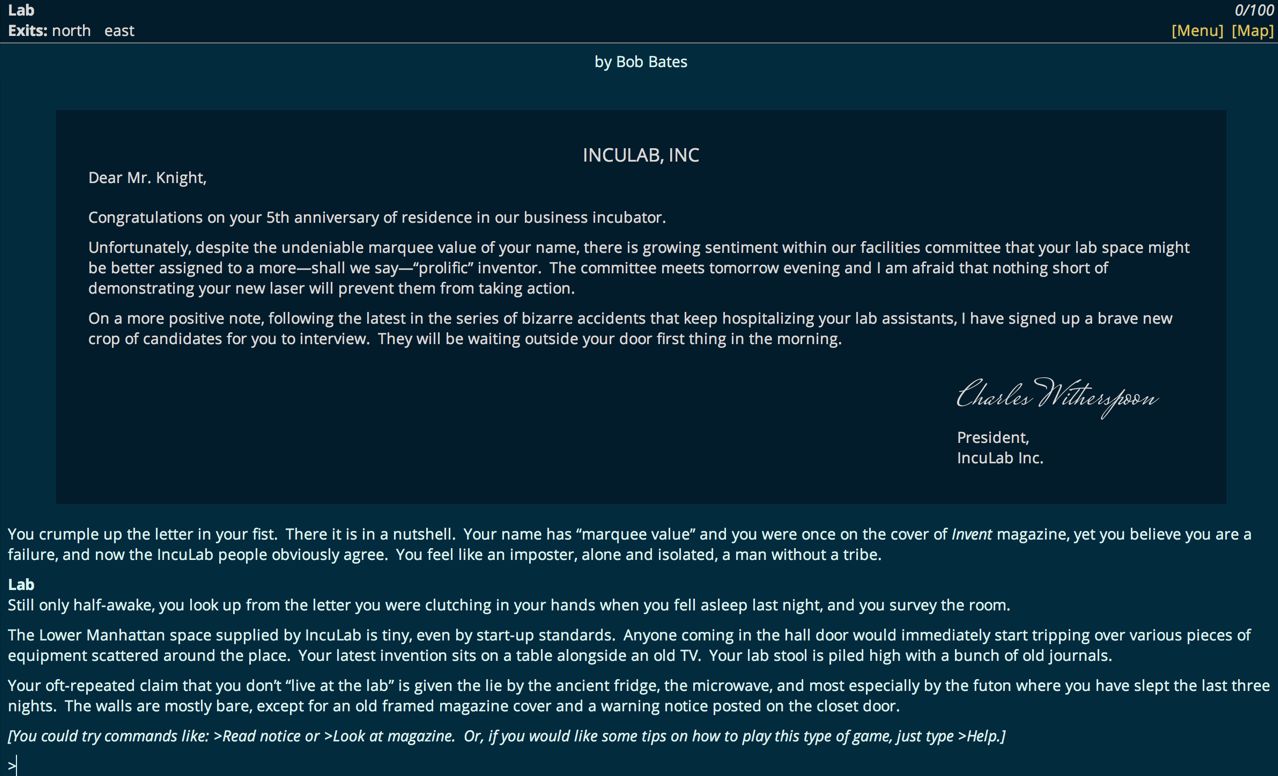
At the same time, Thaumistry offers ease-of-use features Infocom was never able to provide. Bates made it as newcomer-friendly as possible, with relatively easy puzzles, a robust adaptive hint system, and a map that reveals new areas as you explore. Its parser vocabulary is larger than the Infocom standard, and the text is not constrained by the same old memory limits, meaning it can fit a huge range of custom responses to all sorts of actions.
(In this regard, Bates does draw on the gains of the post-commercial interactive fiction era: Thaumistry is written in TADS 3, the Text Adventure Development System created by Michael J. Roberts and designed to provide a host of small and large improvements on the classical text adventure experience.)
Bates' professional game development experience shines through in the discipline of Thaumistry's implementation. This is the creation of a designer happy to give the player as much feedback as possible, as long as it doesn't complicate the world state. The spells give all kinds of interesting responses when cast in different places and on different objects, but none make a permanent change to the environment unless they're actually solving a puzzle.
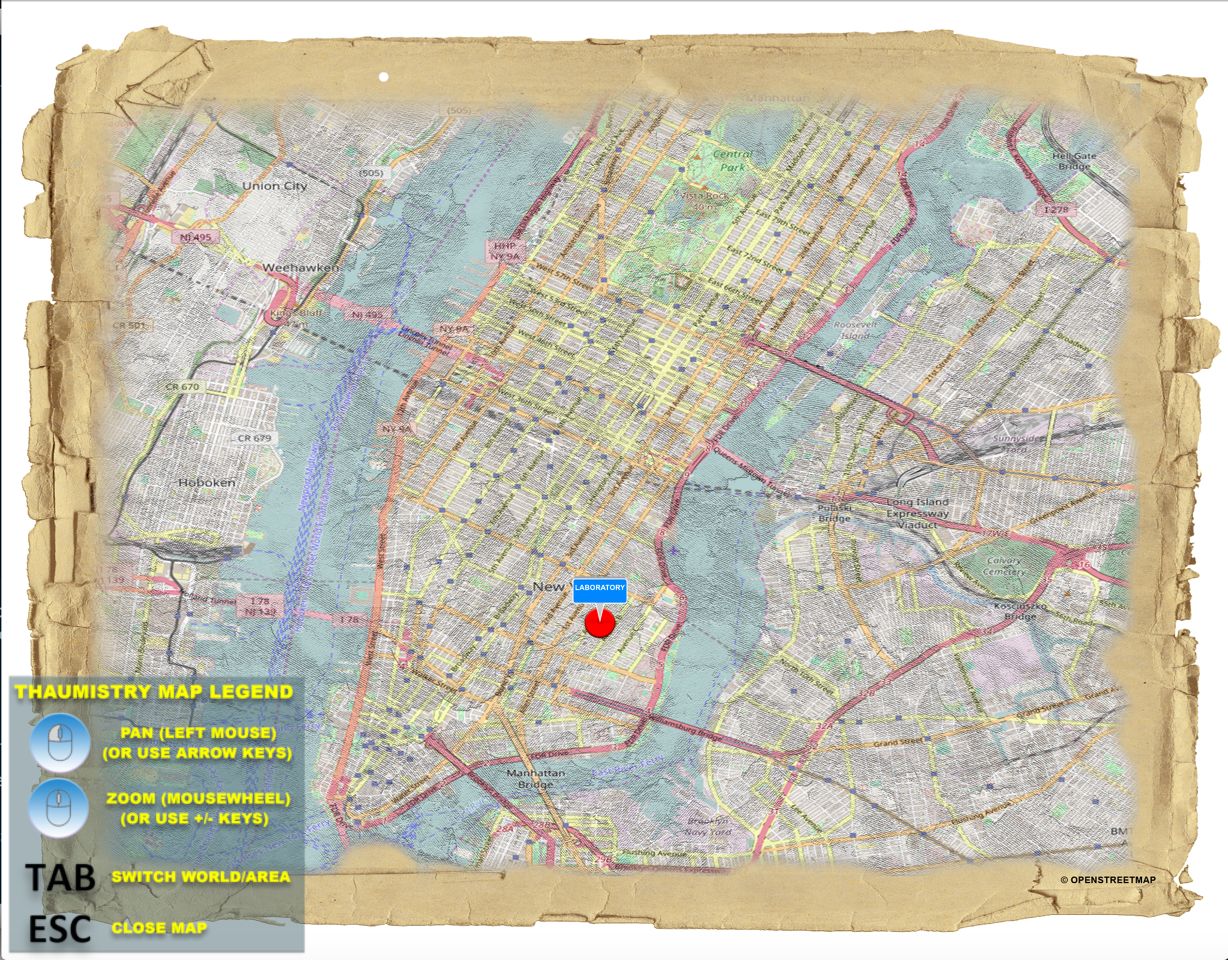
Most spells only solve one or two puzzles; environments contain relatively few red herrings; scoring consistently signals whether the last action was a good idea. Also, descriptions remind the player of their current goals, like so:
Keep up to date with the most important stories and the best deals, as picked by the PC Gamer team.
Hall of Energy
The Hall’s immense space feels oddly bare as it undergoes renovation. From here you can go north to Glick Hall or south to the Rotunda. Of course, you could go into the Waterstone Industries booth to the east (if you can get past Rani), or perhaps into the unmarked booth to the west.
Still, Bates tells me, he had ambitions for the piece that went beyond the tidy pleasure of a classic puzzle game. "I did want the game to be 'about' something," he says, "and that something is Identity. I wanted to explore how people come to decide who they are and how they define themselves... There isn’t some grand message here, although there is an abiding sense that your identity is strongly linked to what you decide to do."
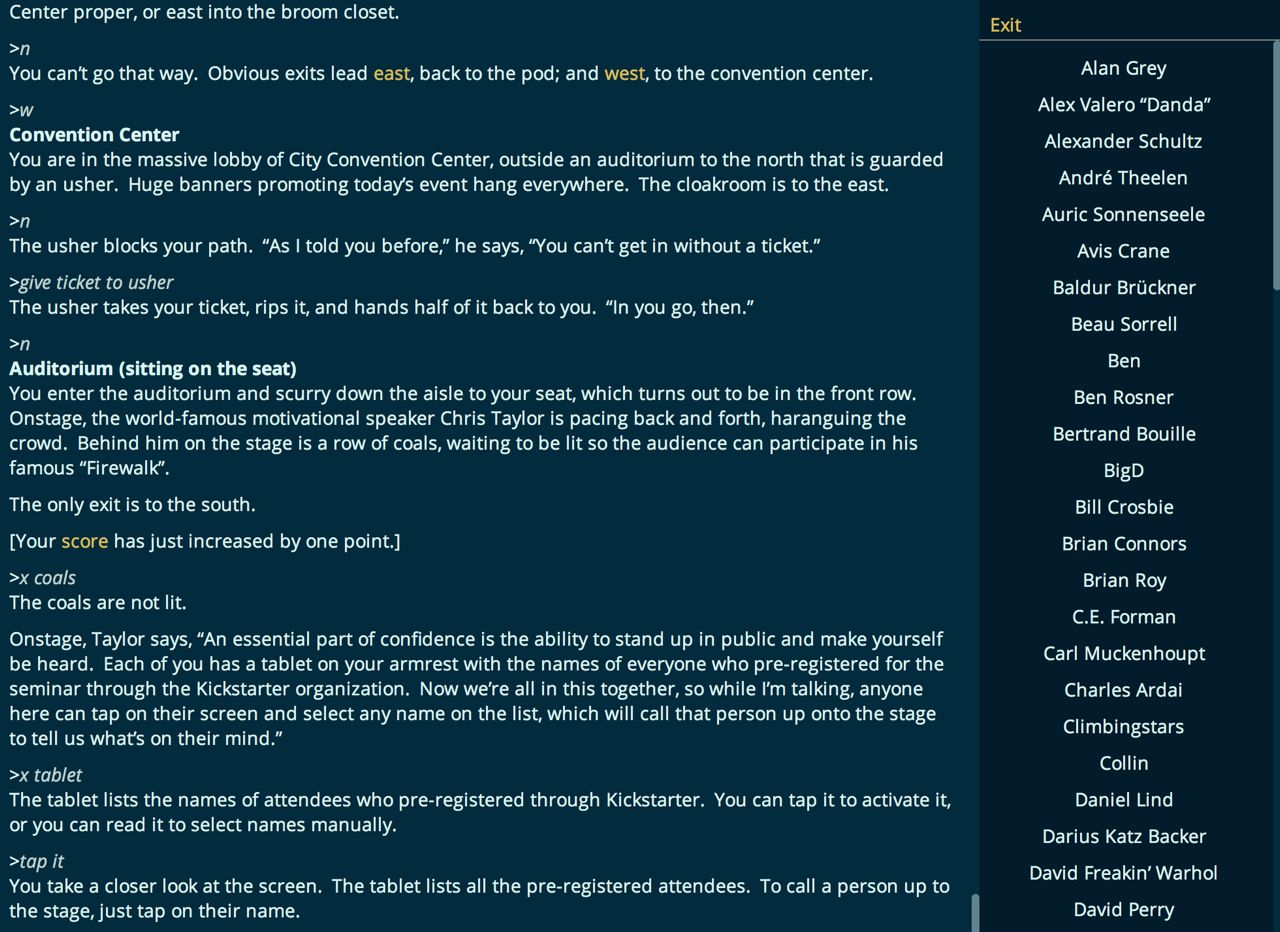
This aspect of the story comes out mostly in conversations with the NPCs, and in their responses to a memory-jogging spell. There are a few characters who will only respond to this spell by remembering some minor errand, but many of them will respond with information about formative events in their lives.
Thaumistry's streamlined writing also serves the puzzles better than it serves the themes.
Of the game's 29 NPCs, the most important (and persistently accessible) are your six fellow inventors. All of these have some form of origin story, some reason for choosing to focus on this particular type of invention. The man working on better ways to transport medical supplies is responding to the death of a beloved aunt who lived in a poor neighborhood with limited access to services. The attractive twins are working on a duplication device, and grumbling about being pigeonholed by people who don't respect them for their genius.
As Bates himself is quick to acknowledge, the identity theme recedes to the background in comparison to the puzzles. Thaumistry doesn't force the player to engage with character identity directly; there are no puzzles dependent on understanding the personality of an NPC. (There's one possible exception, but it applies to a non-human being.) Some of this comes about because he wanted to avoid dialogue trees, with conversations instead triggered by simple commands like ASK LUIZ ABOUT TOPIC, but that meant severely constraining how much of any given character's backstory he could require a player to understand.
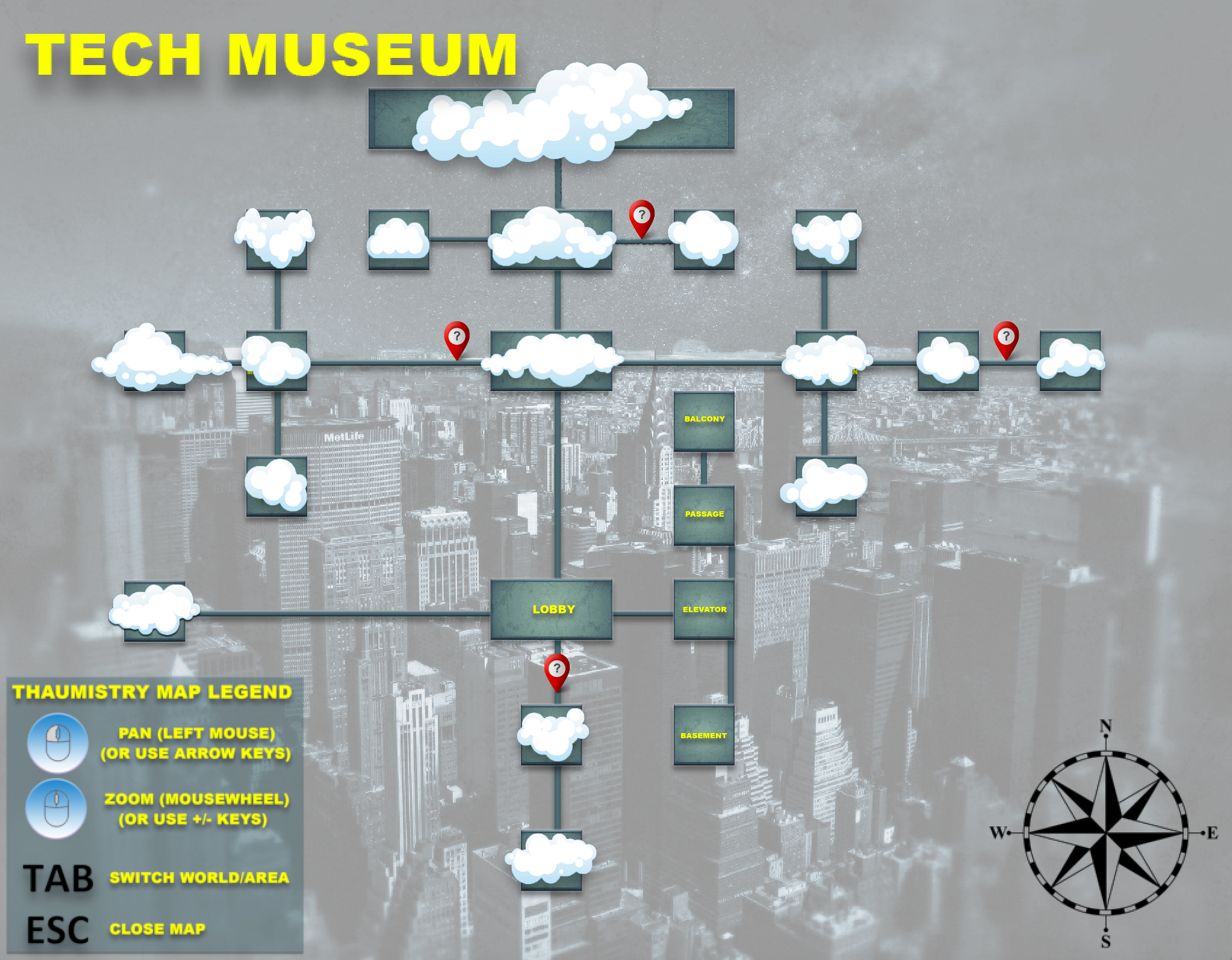
Whenever there's a contest between the theme and a puzzle design, the puzzle design wins out: several characters send the player on rather selfish fetch-quests though their personalities suggest they should be more willing to offer altruistic help.
Thaumistry's streamlined writing also serves the puzzles better than it serves the themes. Bates deliberately avoids nuances that might confuse the player or send them down the wrong track. From the beginning, the NPCs tend towards the cartoonish. You have an energetic guide called Jack who practically bounces off the walls. Later characters will state their reasons for action in the plainest possible language. For instance:
"I remember the first time I held a check for a million dollars in my hand," he says. "I felt... disappointed." He pauses. "That’s when I knew there was more to life than just making money."
The statement is abstract and impersonal. We're given no context to what this character felt before the discovery. There’s no personal spin.
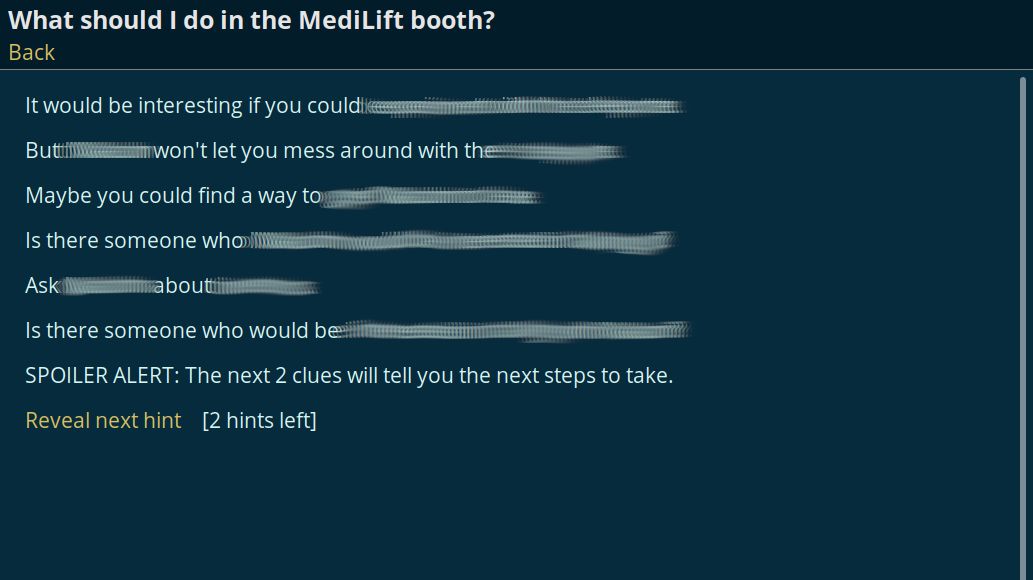
None of this is to say that a text adventure can't get into questions of identity or moral formation, only that Thaumistry does not explore that territory very deeply. One of the great pleasures of parser-based fiction is the way it lets an author define their own interaction verbs—verbs that then serve as a writing prompt for future development, as the author is required again and again to decide what that particular verb will do to this particular object or person.
That's especially true in a spell-casting game like this one, where the spells can be defined to do more or less whatever you choose. In Thaumistry, Bates gives us only one verb for exploring identity, the memory spell—but many more verbs for exploring belches, levitation, or the results of squeezing something around the middle.

